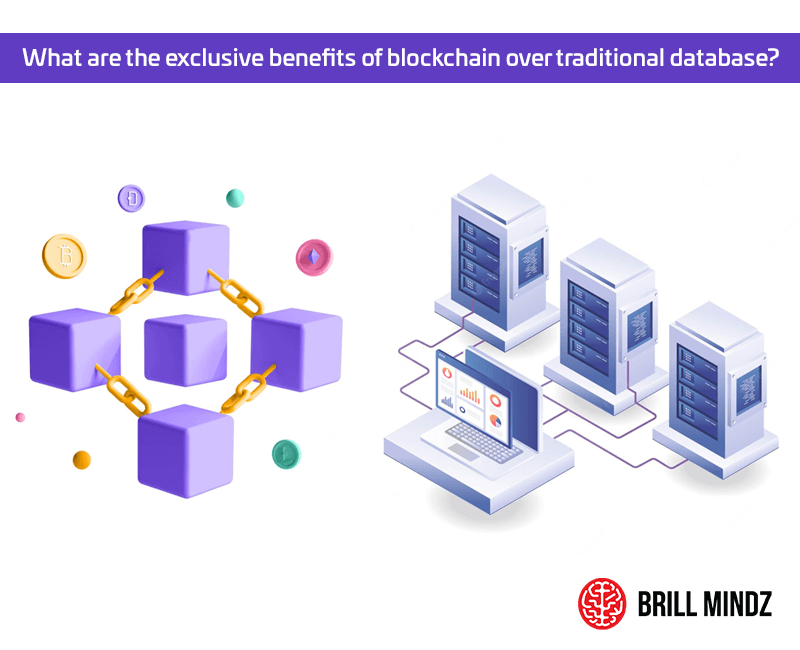What are the Exclusive Benefits of Blockchain over a Traditional Database?
Blockchain Technology has seen tremendous growth in recent years as the trend looks to never slow down in the coming days. But for several businesses, the concept of embracing the latest technological trends along with implementing innovative solutions could be a tedious task. Similarly, knowing whether to employ blockchain technology or stay in the traditional database management will be a complicated task. In this article, you will find the benefits of blockchain over the traditional database to help your business improve.
What is Blockchain?
Blockchain is an entity that stores the entries of a transaction in a digital ledger format which is a highly safe one for data. All kinds of digital transactions are stored in the form of a block, the primary one called genesis. With the increase in the number of transactions, there will be an increase in the number of blocks. All the blocks will be connected in an ordered form leading to a chain of blocks which is termed a Blockchain. It is unique from others since it does not need any middleman to carry out any kind of transaction, especially in the financial segment. Blockchain is a robust system with a decentralized ledger with multiple nodes that are interconnected in a network. The system will have a link to the copy of a ledger and once the entry is done, it is almost impossible to alter it.
What is a Traditional Database?
They can be defined as the straightforward format of data storage without any complexities in management and operations. In this format, parties having direct access to the format will have the ability to read or write. To explain further, the simple database can be managed, altered, or supervised by a DB admin or administrator who will authorize the complete database. This admin has the right to execute several key actions impacting performance along with taking care of its overall size. Relying on the size and scaling pace of various organizations make use of the database for performing the data related entries. The reason for the widespread usage of the traditional database is its utility to offer easy data fetching termed as querying of data with the aid of languages like SQL.
Benefits of blockchain over a traditional database (DB):
Authority:
The traditional database and blockchain have a significant difference in terms of use authority. While users cannot download the database as they follow a centralized approach with a single server in physical space. The concerned admin will have control of the DB with permissions needed to give access after guaranteeing the required documents. In this mode, it could be one small group of individuals or even a single user who will have the control to control and carry over the DB.
Blockchain is highly unique in its operation due to the decentralized format that makes them almost impossible to be penetrative. Since there are multiple modes present in the blockchain, the crashing of one node will not impact the working of the complete network. Since the data stored in one PC should be duplicated on all the nodes of the network, the decentralized feature is the best option if you are looking to get high security. If any malicious person has to hack all the information, then he should do it after taking control of all nodes which is not straightforward. This system will help act as a shield for all malicious activities by avoiding fraudsters.
Resiliency:
As mentioned above, traditional data storage systems have a centralized mode making them viable for unified failures. Due to this, there is a chance of complete data loss if there are any attacks on the central server by fraudsters. The results of the data loss could be upsetting and even irreversible sometimes depending on the kind of data stored in the system. Blockchain storage is resilient to all kinds of cyber-attacks along with no risks of data loss as the same data will be stored on all the connected nodes. This implies that if you have to store crucial information then blockchain-based storage is the best option for the purpose.
Security:
It is one of the major minus points for traditional databases posing risk for security elements especially w.r.t to the data. Without closely monitoring the complete data structure, malicious persons have the chance of utilizing a single issue and gaining hands over the crucial information that could derail the entire system. Blockchain is very secure when compared to the traditional database in this regard. Instead of relying on a single server Blockchain function by providing a copy of the data chain to every node for verification. The system will correct any unreliable data by recognizing any variations in the node.
Tampering is not possible:
Any kind of data stored over the Blockchain cannot be tampered with since block validations do not allow them. As the information will be recorded on a digital public ledger stored over several nodes, this technology is strong against any kind of tampering. Even if a hacker wants to steal the information, then he has to get authority over all the nodes which is almost impossible. Since it’s a distributed ledger system, the data over Blockchain cannot be hidden at all making it highly reliable to the involved parties. Further, Blockchain is an open platform for all users making it a favourable technology for secured data storage.
Final Thoughts:
The decision to choose your data storage technology for the future could be a tricky one if you fail to understand the exact benefits. If you are looking to gain all the above-mentioned benefits along with a futuristic vision, then Blockchain will be the best choice for your needs. If you are in a dilemma to pick between the traditional database or Blockchain, then you can take expert guidance from pioneers like Brillmindz technologies. This digital transformation company has built several advanced products that are ruling the competitive market in the respective segments.













